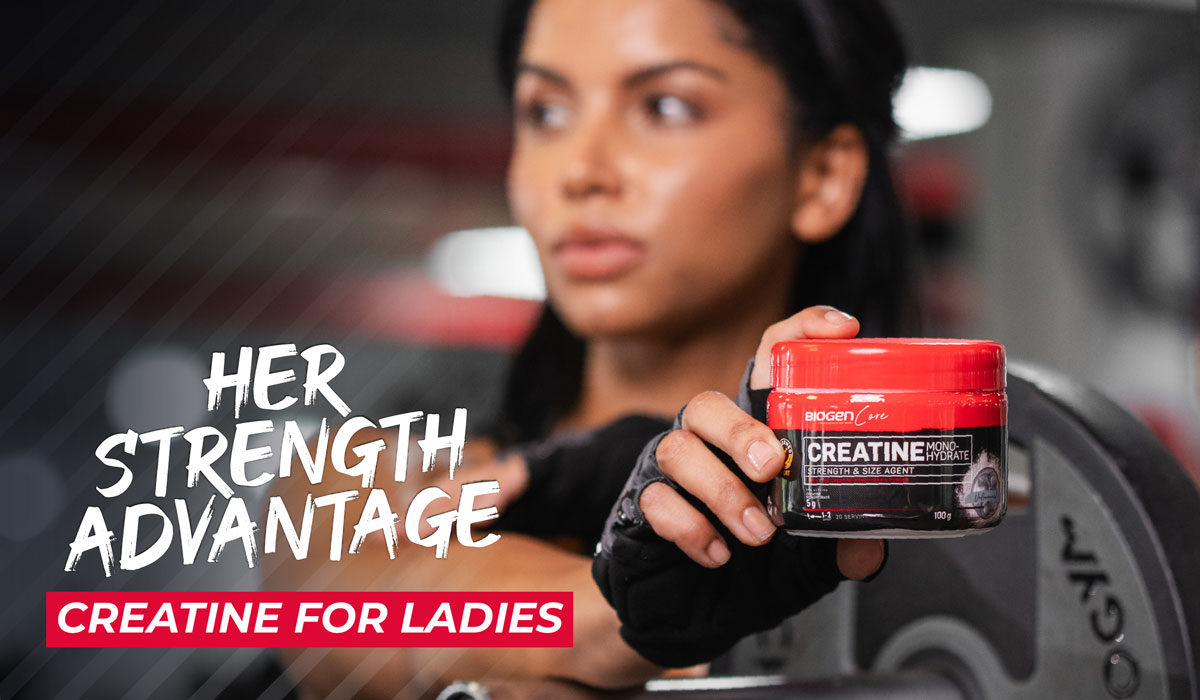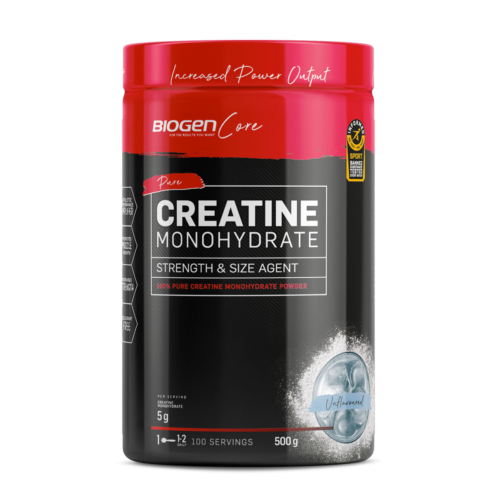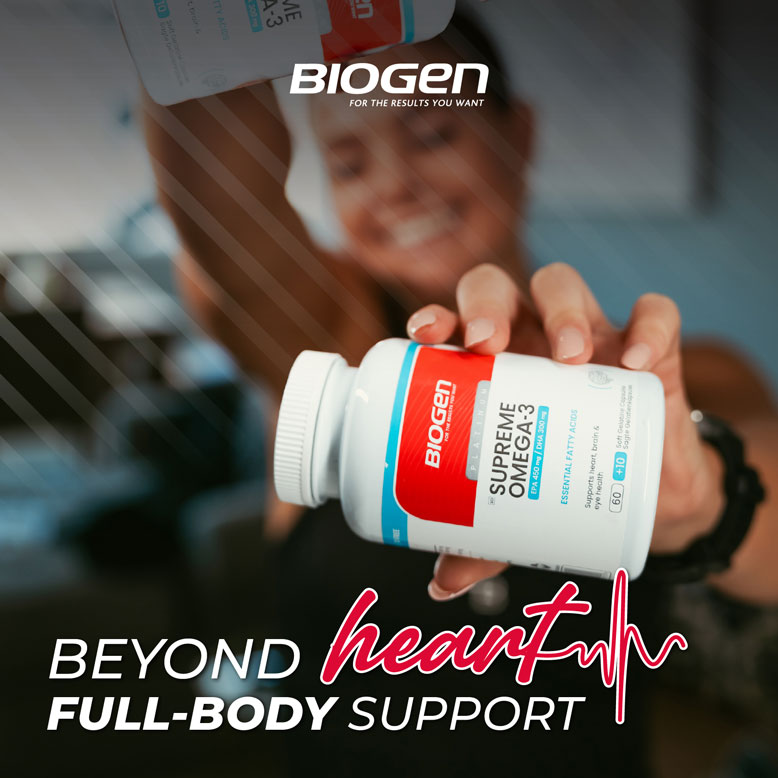
Why Creatine Deserves a Place in Every Woman’s Supplement Stack
Creatine is one of the most effective supplements available to improve our strength and performance in the gym, with extensive research backing these claims, yet many ladies still shy away from this super supplement due to the many myths surrounding its use.
Common misconceptions about creatine use by women include unfounded fears that it will make you bulky, lead to water retention and bloating and that creatine is bad for your kidneys.
Others believe that creatine isn’t meant for women and only offers benefits to male bodybuilders and athletes in power sports. But nothing could be further from the truth!
Better benefits for women
Creatine offers anyone serious about their training and muscle gains – including women – a cost-effective product that delivers numerous proven benefits.
Firstly, creatine works for males and females and is safe and well-tolerated by both men and women¹.
In fact, research suggests that women may get a bigger benefit from adding a creatine supplement to their daily routine, with value at every stage in a woman’s life, including menopause².
These outsized female-specific benefits stem from the fact that women typically have 70–80% lower creatine stores in their bodies compared to men². Hormonal fluctuations during menstruation, pregnancy, postpartum, and menopause can also affect creatine levels.
So don’t believe the myths. Discover how women can improve their strength, support lean muscle development, improve recovery, and help maintain a better quality of life with creatine.
How creatine works
Creatine is a naturally occurring compound found in small quantities in foods like red meat and fish, with creatine supplements offering a convenient and effective option for anyone looking to boost their gym performance.
Our body uses the phosphocreatine (PCr) we get from food and supplements to support energy production to fuel short and intense muscle contractions. With a limited amount of creatine stored in our muscle cells (the primary storage site in the body), boosting creatine stores with a supplement can deliver various physical and performance benefits.
Training benefits for women
Boosting creatine stores with a supplement enables you to sustain the intense short-duration muscle contractions for longer during resistance training sessions.
By increasing strength, power and muscular endurance in this way, you can train harder for longer, which helps you lift heavier weights for an extra few reps every set.
This elevated workout capacity increases the stimulus muscle tissue needs to grow stronger and bigger with the appropriate recovery and nutritional support, rather than any direct effects on muscle growth, as is the case with supplemental protein.
This is why creatine itself does not make women (or men, for that matter) big and bulky on its own. It merely helps you lift more weight for more reps.
Due to lower levels of the main muscle-building hormone testosterone, women are more likely to see increased muscle tone and strength from creatine, rather than any significant increase in muscle size or mass.
Creatine aids recovery
Research³ by Australian researchers has shown that creatine may deliver a greater muscle-sparing effect than whey protein.
Based on the findings, the researchers concluded: “Creatine supplementation appears to offer an element of myo-protection which was not observed following whey protein supplementation.”
The findings from the study suggest that the ability of a creatine supplement to support muscle growth runs deeper than its ability to generate functional strength.
According to the Australian researchers, observations from the study suggest that supplementing with creatine reduces the extent of muscle damage and/or enhances the growth of the regenerating fibres.
They suggest that the structural improvements are due to increased cell fluid volume that occurred in the earlier stages of the study, which may underpin the benefits observed in the later stages of recovery.
Support during menopause
Several hormonal changes happen during menopause that significantly impact a woman’s body composition, with declining oestrogen levels the most significant.
These hormonal changes can result in muscle loss and reduced bone density, which is exacerbated by age-related muscle loss known as sarcopenia, which can begin as early as your thirties, with women losing 3-8% of their muscle mass per decade, with that rate increasing after 60⁵.
A landmark study⁶ on the benefits of creatine supplements throughout a woman’s lifecycle confirmed that, when combined with resistance training, “creatine further augments body composition and bone mineral density, particularly in post-menopausal females.”
Post-menopausal women who took higher doses (0.3 g·kg⁻¹·d⁻¹) also experienced benefits by developing more muscle and improving muscle function when taken alongside resistance training, which led to favourable effects on bone density.
What about water retention?
While creatine increases water absorption and retention in the muscle cells, which contributes to increased strength and energy, this is different from the uncomfortable puffiness of bloating.
If bloating occurs, it’s often due to improper dosage or individual sensitivity, and adjusting the dose can usually help.
Creatine supplement options
Creatine monohydrate is the most common form of creatine available today, and it is considered by many to be the most effective.
According to the International Society of Sports Nutrition’s position stand⁷, “creatine monohydrate is the most effective ergogenic nutritional supplement currently available to athletes in terms of increasing high-intensity exercise capacity and lean body mass during training.”
Various studies³ over the last three decades have shown that creatine monohydrate supplementation for 4–12 weeks increases muscle creatine and PCr content by 20–40%.
A product like Biogen Pure Creatine Monohydrate delivers 5g of this strength-boosting ingredient per serving, making it an effective addition to your supplement plan.
To reap the benefits of creatine, it is best to use it consistently with a cycled protocol. Always follow label recommendations.
Creatine considerations
Some women may also have concerns about the impact that creatine has on their kidneys. While this remains a pervasive myth, there is no evidence to support the claims that creatine causes kidney damage or negatively impacts normal function.
For healthy individuals, research⁸ consistently shows that creatine, when used as directed, does not cause kidney damage.
While creatine metabolism produces creatinine, which is filtered by the kidneys, this is a normal process and not harmful in healthy individuals. However, people with pre-existing kidney conditions should consult their doctor before taking any supplements, including creatine.
In fact, it is always advisable to consult with your healthcare professional before starting any new supplement, including creatine, especially if you have underlying medical conditions or concerns about how it may interact with other medications or supplements you are taking.
References:
- Kreider RB, Kalman DS, Antonio J, Ziegenfuss TN, Wildman R, Collins R, Candow DG, Kleiner SM, Almada AL, Lopez HL. International Society of Sports Nutrition position stand: safety and efficacy of creatine supplementation in exercise, sport, and medicine. J Int Soc Sports Nutr. 2017 Jun 13;14:18. doi: 10.1186/s12970-017-0173-z. PMID: 28615996; PMCID: PMC5469049.
- Smith-Ryan AE, Cabre HE, Eckerson JM, Candow DG. Creatine Supplementation in Women’s Health: A Lifespan Perspective. Nutrients. 2021 Mar 8;13(3):877. doi: 10.3390/nu13030877. PMID: 33800439; PMCID: PMC7998865.
- Role of Creatine Supplementation in Conditions Involving Mitochondrial Dysfunction: A Narrative Review. Nutrients 2022, 14(3), 529; https://doi.org/10.3390/nu14030529.
- Myoprotective Potential of Creatine Is Greater than Whey Protein after Chemically-Induced Damage in Rat Skeletal Muscle. Nutrients. 2018 May; 10(5): 553. Published online 2018 Apr 30. doi: 10.3390/nu10050553.
- Volpi E, Nazemi R, Fujita S. Muscle tissue changes with aging. Curr Opin Clin Nutr Metab Care. 2004 Jul;7(4):405-10. doi: 10.1097/01.mco.0000134362.76653.b2. PMID: 15192443; PMCID: PMC2804956.
- Smith-Ryan AE, Cabre HE, Eckerson JM, Candow DG. Creatine Supplementation in Women’s Health: A Lifespan Perspective. Nutrients. 2021 Mar 8;13(3):877. doi: 10.3390/nu13030877. PMID: 33800439; PMCID: PMC7998865.
- Kreider RB, Kalman DS, Antonio J, Ziegenfuss TN, Wildman R, Collins R, Candow DG, Kleiner SM, Almada AL, Lopez HL. International Society of Sports Nutrition position stand: safety and efficacy of creatine supplementation in exercise, sport, and medicine. J Int Soc Sports Nutr. 2017 Jun 13;14:18. doi: 10.1186/s12970-017-0173-z. PMID: 28615996; PMCID: PMC5469049.
- Vega J, Huidobro E JP. Efectos en la función renal de la suplementación de creatina con fines deportivos [Effects of creatine supplementation on renal function]. Rev Med Chil. 2019 May;147(5):628-633. Spanish. doi: 10.4067/S0034-98872019000500628. PMID: 31859895.












